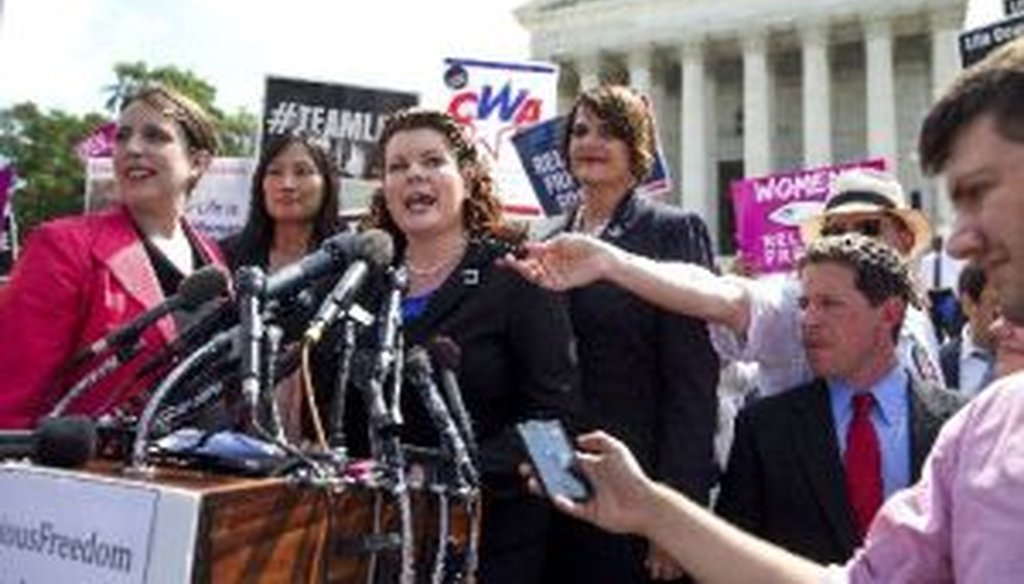Stand up for the facts!
Our only agenda is to publish the truth so you can be an informed participant in democracy.
We need your help.
I would like to contribute

Lori Windham, the lead attorney for Hobby Lobby, speaks after a 5-4 ruling in the retailer's favor, outside the Supreme Court on June 30, 2014.
On June 30, the U.S. Supreme Court ruled that certain companies with religious objections can opt out of a mandate under the Affordable Care Act to provide free contraception to their employees.
The 5-4 ruling involved a case brought by two companies owned by Christian families: Hobby Lobby, a chain of hobby stores, and Conestoga Wood Specialties, which makes wood cabinets. The companies opposed providing certain types of contraception that they believe is equivalent to inducing abortion, including morning-after pills and IUDs. (They didn’t oppose other methods of birth control.) They based their case on the 1993 Religious Freedom Restoration Act signed by President Bill Clinton.
The issue arose because birth control is included among the free preventative services mandated by President Barack Obama’s signature 2010 health care law. Houses of worship and religious institutions were already exempt from this aspect of the law. The court’s ruling applies to "closed corporations" which are in control by a few people, rather than public companies with many shareholders.
Associate Justice Samuel Alito wrote the majority opinion, stating that women who work for these corporations can still access these types of birth control either by the federal government paying for it or through a third-party administrator.
Though the ruling was narrower in scope than it could have been, supporters of broad access to contraception expressed disappointment.
- U.S. Rep. Debbie Wasserman Schultz, the Democratic National Committee chair from South Florida, said that contraception for women isn’t just about avoiding pregnancy. "Nearly 60 percent of women who use birth control do so for more than just family planning," she said. We fact-checked Wasserman's claim and rated it Mostly True.
- Liberal pundit and contributor Sally Kohn panned the court’s decision as disastrous and Hobby Lobby’s intentions as disingenuous. "Hobby Lobby provided this coverage before they decided to drop it to file suit, which was politically motivated," she said. PunditFact rated that Mostly True.
- Associate Justice Ruth Bader Ginsburg’s stinging dissent attracted wide attention from those who opposed the majority opinion. We checked the following claim in Ginsburg’s dissent: "Women of childbearing age spend 68 percent more in out-of-pocket health care costs than men." We found that a litany of politicians and advocates had used that statistic, which is based on data that’s more than 20 years old. But we looked at more recent data and found that women do still pay more out of pocket for health care than men do, with one estimate very close to Ginsburg's number -- 69 percent -- and other estimates in the 40 percent to 50 percent range. We rated the claim Mostly True.
- Progressive groups -- and even Justice Ginsburg -- have warned the court's majority opinion in the Hobby Lobby case is a slipper slope that could affect other medical procedures like immunizations and blood transfusions. We don't have a crystal ball to know how future courts will interpret Alito's words. But experts told us while future challenges are likely, history says there will be relatively few and corporations that make similar challenges face an uphill battle to convince the court they're in the same boat as Hobby Lobby. Read our story here.
We're fact-checking other claims from the case and will update this story as we complete them.
Our Sources
See individual fact-checks for sources.




































